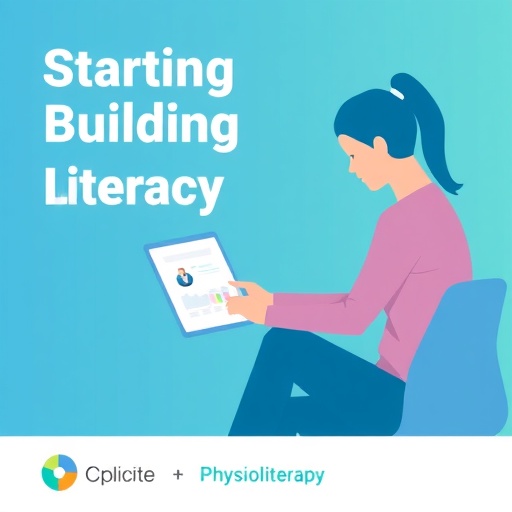In recent years, social media has revolutionized the way individuals, especially students in various educational disciplines, connect, communicate, and gather information. This transformation is particularly pronounced within medical education, where the influx of online influencers has altered traditional learning paradigms. In a groundbreaking study led by Wilczyński, Antczak, de Tillier, and colleagues, the focus centers on physiotherapy students and their trust in physiotherapy influencers on social media platforms. The implications of their findings extend into the realm of digital literacy training, a critical component of modern medical education that remains under-discussed and under-implemented.
The study systematically investigates how physiotherapy students discern credible information from social media influencers. With a plethora of content available online, including videos, blogs, and podcasts, students often find themselves navigating a complex web of information that can be both beneficial and misleading. The narrative that emerges is one wherein social media serves dual functions: as a valuable resource for learning and a potential source of misinformation. This duality is prevalent across all areas of healthcare education and emphasizes the need for a discerning approach in evaluating the trustworthiness of information found online.
Physiotherapy students, much like their peers in other medical fields, regardless of their increasing reliance on social media for educational content, exhibit varying levels of trust in the information they encounter. This variability in trust raises significant questions about the educational strategies employed in teaching students how to evaluate and incorporate social media insights into their practice. The researchers employed a mixed-methods approach, including surveys and interviews, to assess the trust factors influencing students’ perceptions of social media content concerning physiotherapy.
Key findings indicated that credibility, expertise, and relatability significantly shaped students’ trust in physiotherapy influencers. Influencers who presented themselves as relatable or who shared personal stories were given more credence, often overshadowing the more traditionally qualified sources. This trend highlights a departure from conventional wisdom that prioritizes qualifications and experience over personal connection in the establishment of trust. Such insights raise profound implications for how educators can better prepare future healthcare practitioners to navigate the digital landscape responsibly.
In addressing the emergent concerns regarding the reliability of online information, one cannot overlook the role of digital literacy training in medical curricula. The authors argue for an urgent need to integrate comprehensive digital literacy frameworks that equip students not only to consume information but to critically evaluate its validity and relevance. Such training could be pivotal in demystifying the criteria by which students assess online content, ultimately fostering a more discerning approach that could spell the difference between effective and ineffective patient care in the future.
As the educational landscape continues to evolve with technological advancements, the research emphasizes the imperative for educators to redefine their strategies. The inclusion of digital literacy into medical training programs could arm future physiotherapists with the necessary skills to extract useful knowledge from social media while protecting themselves and their patients from the potential harms of misinformation. The ability to critically evaluate social media content should be as fundamental as learning anatomy or diagnostic skills in physiotherapy education.
Moreover, the study anticipates resistance or hesitance from traditional educators who may misconstrue the value of social media as a learning tool. However, the authors stress that viewing social media as merely a platform for leisure discounts its increasing role as an educational instrument. Future educators must acknowledge and embrace this reality, blending traditional teaching methodologies with contemporary digital practices to create a robust, multifaceted educational approach.
The implications of this research extend beyond merely improving student outcomes; they underscore the necessity for regulatory bodies in healthcare education to establish guidelines and standards that govern the use of social media for educational purposes. These regulations could provide a framework wherein online influencers are held accountable for the information they disseminate while ensuring that students engage with credible, evidence-based content.
As disciplines such as physiotherapy increasingly embrace the digital era, the findings from Wilczyński and colleagues serve as a clarion call for change. The establishment of professional standards for social media influencers in the healthcare domain could enhance the credibility of the content shared online, making it a more valuable resource for students and practitioners alike. Ultimately, the goal should be to create a balanced informational ecosystem where reputable influencers enrich the educational journey, thus fostering a culture of continual learning among students.
In conclusion, the trust students place in social media physiotherapy influencers presents a vital area for further investigation and action. As digital platforms continue to shape the future of medical education, it is essential that educators, regulators, and influencers collaborate to harness social media’s potential positively. By equipping students with the skills to navigate this landscape effectively, we can cultivate a new generation of physiotherapists who are adept at discerning credible information while engaging with patients in an increasingly digital world.
The ramifications of this modern phenomenon will undoubtedly resonate throughout healthcare systems, influencing not only how education is delivered but also how care is provided. As we look toward the future, the interplay between technology and education will prove to be one of the defining challenges—and opportunities—of our time in healthcare.
Subject of Research: Trust in social-media physiotherapy influencers by physiotherapy students and implications for digital literacy training in medical education.
Article Title: Physiotherapy students’ trust in social-media physiotherapy influencers: implications for digital-literacy training in medical education.
Article References:
Wilczyński, B., Antczak, H., de Tillier, K. et al. Physiotherapy students’ trust in social-media physiotherapy influencers: implications for digital-literacy training in medical education. BMC Med Educ 25, 1215 (2025). https://doi.org/10.1186/s12909-025-07760-0
Image Credits: AI Generated
DOI: 10.1186/s12909-025-07760-0
Keywords: Physiotherapy education, digital literacy training, social media influencers, trust, misinformation, medical education.




